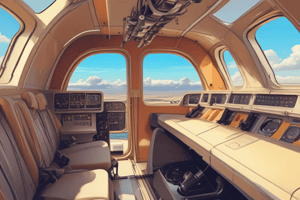Podcast
Questions and Answers
What is the indicated visibility along the touchdown zone (TDZ)?
What is the indicated visibility along the touchdown zone (TDZ)?
- RVR A (correct)
- RVR C
- RVR B
- RVR D
What is the minimum required runway length available (LDA) for a jet aircraft to take off?
What is the minimum required runway length available (LDA) for a jet aircraft to take off?
- 50%
- 30%
- 70%
- 60% (correct)
At what distance from land does a transport aircraft require a life raft when flying over water?
At what distance from land does a transport aircraft require a life raft when flying over water?
- 300 NM, 90 mins
- 400 NM, 120 mins (correct)
- 200 NM, 60 mins
- 500 NM, 150 mins
What speed should a turbo-jet aircraft reduce to before entering a holding pattern above 14,000 feet?
What speed should a turbo-jet aircraft reduce to before entering a holding pattern above 14,000 feet?
What is the maximum indicated airspeed (IAS) at a controlled airport below 3,000 feet AGL and within 10 nautical miles?
What is the maximum indicated airspeed (IAS) at a controlled airport below 3,000 feet AGL and within 10 nautical miles?
What is the reason for ear and sinus pain during a flight?
What is the reason for ear and sinus pain during a flight?
What is the purpose of an anti-skid system in an aircraft?
What is the purpose of an anti-skid system in an aircraft?
Does an infant need to fasten their seatbelt?
Does an infant need to fasten their seatbelt?
What do you do when the aircraft approach speed is faster than normal?
What do you do when the aircraft approach speed is faster than normal?
When does the CVR work?
When does the CVR work?
What does Code 7700 7500 7600 mean?
What does Code 7700 7500 7600 mean?
What are the limits of the NAT MNPE:
What are the limits of the NAT MNPE:
How far should you avoid a thunderstorm with a top over 30000 feet?
How far should you avoid a thunderstorm with a top over 30000 feet?
Flashcards are hidden until you start studying
Study Notes
Aviation Operational Requirements
- RVR A indicates visibility along the touchdown zone (TDZ).
- Jet aircraft can take off when the destination runway has at least 60% of the Landing Distance Available (LDA).
Life Raft Requirements
- Transport type A/C requires a life raft when flying over water if the distance to land is greater than 400NM or the flying time is over 120 minutes.
Holding and Speed Restrictions
- Before entering a holding pattern above 14,000ft, turbo-jet aircraft should decrease their speed to 265kts.
- When flying at controlled airports below 3,000ft AGL and within 10nm, the maximum Indicated Air Speed (IAS) is 200kts.
Medical and Safety
- Ear and sinus pain are caused by trapped gas expansion.
- Infants do not need a seat belt, but the adult holding them must have their seat belt fastened.
Approach and Landing
- If the aircraft's approach speed is higher than normal, touchdown as soon as possible after landing, lower the nose, and use maximum braking and reverse thrust.
Aircraft Systems
- The Cockpit Voice Recorder (CVR) starts working as soon as the electrical power is turned on.
Flight Planning and Navigation
- The North Atlantic Tracks (NAT) Minimum Navigation Performance Flight (MNPF) altitude range is between FL285 and FL420.
Weather Avoidance
- When avoiding thunderstorms, maintain a horizontal distance of at least 20nm if the storm tops are above 30,000ft.
- Below the freezing level, maintain a distance of 5nm, and above the freezing level but below 30,000ft, maintain a distance of 10nm.
Emergency Codes
- Codes 7700, 7500, and 7600 indicate a need for immediate assistance.
Aircraft Equipment
- Anti-skid systems are used to prevent rapid deceleration during braking.
Studying That Suits You
Use AI to generate personalized quizzes and flashcards to suit your learning preferences.




